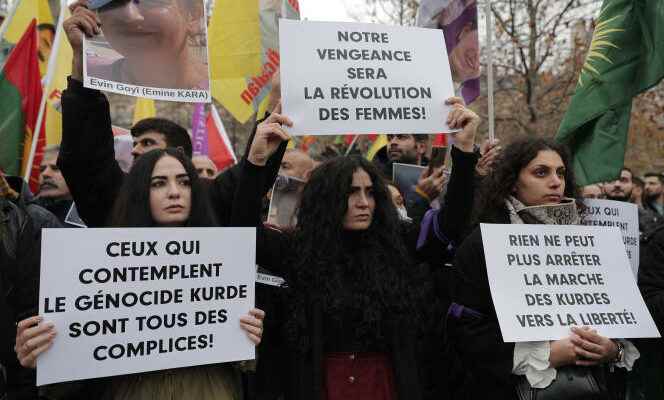Can judicial truth ever be reconciled with the intimate conviction of an entire community? The hypothesis of a racist attack does not fit in any way with the image that the Kurds of France have of themselves. Racist violence, never integrated as a potential threat, would therefore have struck for the first time after forty years of substantial Kurdish presence in France. This eventuality arouses disbelief, even among the highest ranks of the representatives of the Kurdish movement in France.
” How can it be ?, exclaimed, Friday evening December 23, Agit Polat, spokesperson for the Kurdish Democratic Center of France (CDKF). Someone suddenly woke up thinking he hated Kurds and showed up with a gun at the Kurdish Cultural Center. Then he chases one of his victims into a Kurdish restaurant. Then he runs 150 meters in a street full of shops of all origins to enter a Kurdish hairdresser? How to believe in the simple racist crime? ! »
The hypothesis of the action of a Turkish State which, in parallel with the battlefields of the Middle East, has been waging a shadow war in Europe against the Kurdish movement for decades offers a much more credible explanation in the eyes of the Kurds from France. Only the latter scenario makes sense, especially among those close to the national movement. Structured around the Kurdistan Workers’ Party (PKK), it is indeed its unofficial headquarters in Paris, and not a simple community association, which was targeted on Friday, December 23, rue d’Enghien. In France and in Europe, the violence that strikes the Kurds had never before been the result of local xenophobic tensions. It has always descended as a bloody echo of the endless wars of the home country.
Friday’s deadly attack also took place in a particular context. The militant world that gravitates around the Ahmet-Kaya Center was preparing the commemoration of the tenth anniversary of the triple assassination committed on January 9, 2013 against leaders of the Kurdish movement, in another office of the organization, located rue Lafayette, still in the 10e district of Paris. However, the 2013 attack is remembered as the first act of a sequence marked by violence and uncertainty in Turkey.
lead years
In the months and years that followed, the peace process between the PKK and Turkey collapsed. At the same time, an urban guerrilla, a mirror of the war waged by the Kurdish movement against the Islamic State (IS) organization in Syria, set fire to Kurdish towns in southeastern Turkey following a series of attacks. unexplained to date. Turkey then plunged into a climate of civil war, the main loser of which will be the legal branch of the Kurdish movement, criminalized after the historic results it had won in the June 2015 legislative elections. Recep Tayyip Erdogan’s power emerged strengthened and more authoritarian than ever, his army, purged after the failed coup of 2016, launched an assault on Syrian Kurdish areas after having triumphed militarily over the Kurdish movement on its own territory.
You have 59.91% of this article left to read. The following is for subscribers only.
